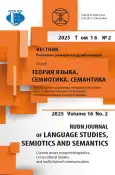Logoepistemes in the Headlines of the Russian and Arabic Press: a Linguocultural Aspect
- Authors: Ibrahim W.F.1, Mamontov A.S.2
-
Affiliations:
- Ain-Shams university
- Pushkin State Russian Language Institute
- Issue: Vol 16, No 2 (2025): Current issues in psycholinguistics, cross-cultural studies, and multichannel communication
- Pages: 556-565
- Section: FUNCTIONAL SEMANTICS
- URL: https://journal-vniispk.ru/2313-2299/article/view/323530
- DOI: https://doi.org/10.22363/2313-2299-2025-16-2-556-565
- EDN: https://elibrary.ru/FIIDCW
- ID: 323530
Cite item
Full Text
Abstract
A discussion is focused on the relationship between language and culture as a prerequisite for the emergence of the term “logoepisteme”, and it is also proposed to consider the reasons for the steady increase in the number of logoepistems in use in Russian and Arabic newspapers, which reflects the tendency to use such techniques as а parody, a language game, etc., which led to the “carnivalization” of language. The study is devoted to the problem of analysis and explication of the specifics of the use of logoepistems in the headlines of modern Russian and Arabic press in a comparative aspect. At the same time, the analysis of those functions that are designed to implement logoepistems in the discourses of newspapers is proposed. A special place in the article is devoted to the consideration of the process of transformation of logoepistems, identification of similarities and differences in the use of the studied units in the Russian and Arabic press. The study also discusses different sources of logoepistems, which provides important information about the dominant values and the most urgent issues of the Russian and Arabic national-linguocultural communities and gives the key to understanding their way of thinking. A study of the use of logoepistemes in headlines in the Russian and Arab press shows that both Russian and Arabic journalists resort to the same techniques. They especially use them in the process of the so-called “language game” and with the aim of causing the effect of “misguided expectations” in order to attract the reader’s attention and encourage him to familiarize himself with the text. The use of logoepistemes is associated with the search for the most adequate expressive means of expression and with the tendency to mix newspaper, journalistic and conversational styles, which, according to press experts, can provide the most adequate effect on today’s readership.
Keywords
About the authors
Wael F. Ibrahim
Ain-Shams university
Author for correspondence.
Email: wfi1980@yahoo.com
ORCID iD: 0000-0002-3314-8672
SPIN-code: 3982-8587
PhD in Philology, Associate professor at the Department of Russian language of the Faculty of foreign languages
El-Khalifa El-Maamoun, El-Abaseya, Cairo, Egypt, 119991Alexander S. Mamontov
Pushkin State Russian Language Institute
Email: as-mamontov2@yandex.ru
ORCID iD: 0000-0002-6703-637X
SPIN-code: 2815-4443
Dr.Sc. (Philology), Professor, Professor of the Department of Russian Literature and Intercultural Communication of the Faculty of Philology
6 Academician Volgina st., Moscow, Russian Federation, 117485References
- Arutyunova, N.D. (1999). Language and the World of Man. Moscow: Yazyki russkoi kul’tury. (In Russ.). EDN: YLAWAR
- Telia, V.N. (1996). Russian phraseology: pragmatic and linguacultural aspects. Moscow: Yazyki russkoi kul’tury. (In Russ.).
- Maslova, V.A. (2001). Lingvoculturology: A textbook for students of higher educational institutions. Moscow: Academy. (In Russ.). EDN: UKCOEJ
- Stepanov, Y.S. (2001). Constants: Dictionary of Russian Culture. Moscow: Academic Project. (In Russ.). EDN: QOFIUB
- Vorobyov, V.V. (1997). Lingvoculturology (theory and methods). Monograph. Moscow: Publ. RUDN University. (In Russ.). EDN: VCELML
- Karasik, V.I. (2002). Language circle: personality, concepts, discourse. Volgograd: Peremena. (In Russ.). EDN: UGQAMP
- Gudkov, D.B. (2003). Theory and Practice of Intercultural Communication. Moscow: Gnosis. (In Russ.).
- Krasnykh, V.V. (2002). Ethnopsycholinguistics and linguacultural studies as constituents of a new scientific paradigm. In: The Sphere of Language and Pragmatics of Speech Communication. International Collection of scientific papers. On the 65th anniversary of the Faculty of RGF of the Kuban State University. Krasnodar. Р. 204‒214. (In Russ.).
- Kostomarov, V.G., & Burvikova, N.D. (2000). Logoepistema as a category of linguoculturological search. In: Lingvodidactic research at the turn of the century: anniversary collection. Moscow: Information and training center of the Pushkin State Russian Language Institute. Р. 88–96. (In Russ.).
- Zhdanov, V.N. (2013). Logoepistema as an iconic linguoculturological unit of Russian discourse. In: Proceedings of the I International Scientific and Practical Interdisciplinary Internet Conference “Humanities and Problems of Modern Communication”. Yakutsk. URL: https://philology.s-vfu.ru/?page_id=755 (accessed 25.12.2021). (In Russ.). EDN: RTRPFV
- Skorokhodova, E.Yu. (2007). The current state of the functional-stylistic system of the Russian literary language. Journal of Philology, 1, 50‒55. (In Russ.). EDN: NITNFV
- Kostomarov, V.G., & Burvikova, N.D. (2000). Modern Russian language and cultural memory. In: Ethnocultural specificity of speech activity. Moscow: INION RAN, 2000, 23–36. (In Russ.). EDN: UKNRSV
- Bayasgalan, D. (2005). Logoepistems from songs and their functions in the Russian-speaking communicative space: [author. dissertation]. Moscow. (In Russ.).
Supplementary files









